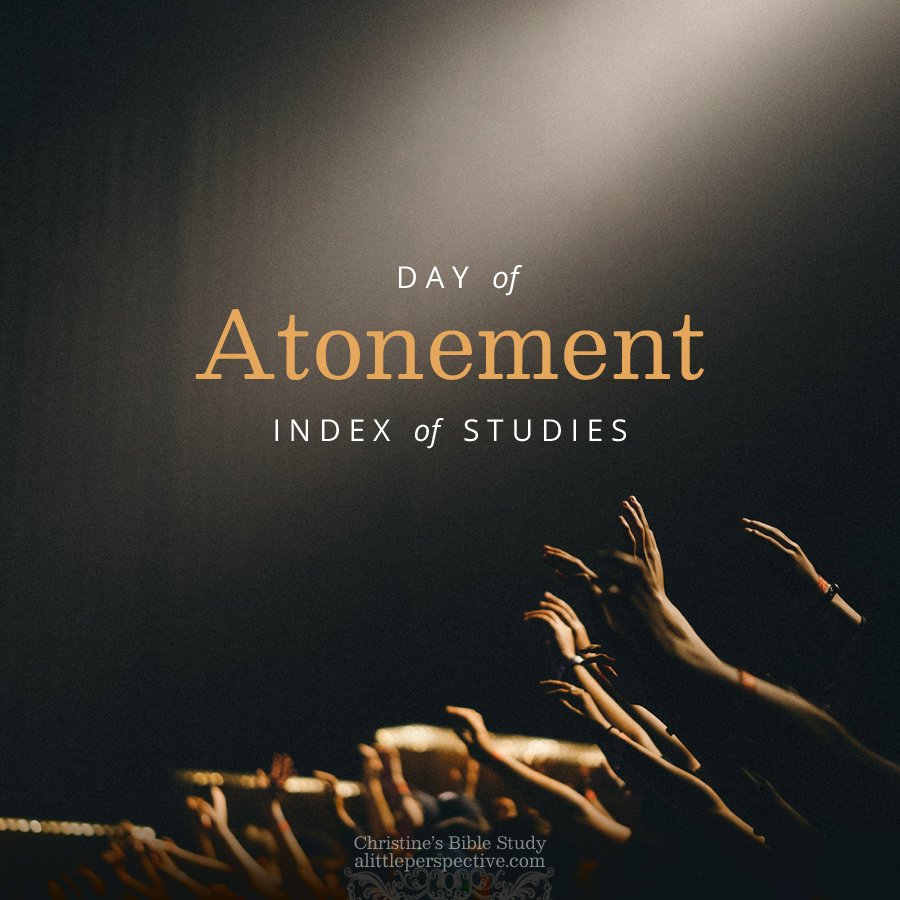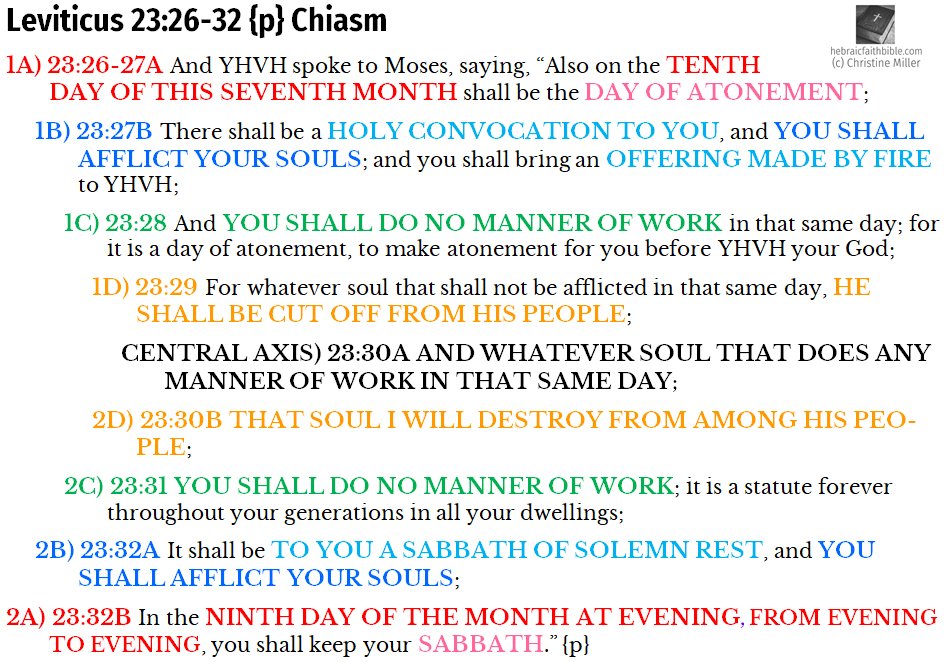26 And YHVH spoke to Moses, saying: 27 “Also on the tenth day of this seventh month shall be the Day of Atonement; there shall be a holy convocation to you, and you shall afflict your souls; and you shall bring an offering made by fire to YHVH. 28 And you shall do no manner of work in that same day; for it is a Day of Atonement, to make atonement for you before YHVH your God. 29 For whatever soul that shall not be afflicted in that same day, he shall be cut off from his people. 30 And whatever soul that does any manner of work in that same day, that soul I will destroy from among his people. 31 You shall do no manner of work; it is a statute forever throughout your generations in all your dwellings. 32 It shall be to you a Sabbath of solemn rest, and you shall afflict your souls; in the ninth day of the month at evening, from evening to evening, you shall keep your Sabbath.” {p} Lev 23:26-32
Day of Atonement Commandments
1. Celebrated on the tenth day of the seventh month.
The days of the Biblical calendar always begin at sundown. The Chiastic Structure brings this out, for it says, the Day of Atonement is on the tenth day, and also, that on the evening of the ninth day, to the evening of the tenth day, we are to celebrate our Atonement Sabbath.
2. The holy convocation.
Neh 8 contains a description of a holy convocation as is commanded on feast days and holidays.
And YHVH spoke to Moses, saying, “Speak to the children of Israel, and say to them: ‘The feasts of YHVH, which you shall proclaim to be holy convocations, these are My feasts.” Lev 23:1-2
A convocation is an assembly of persons who have been called together (Webster’s). In Hebrew, it is from the root word meaning “to call, to call out, to cry out, to proclaim, to summon.” A holy convocation is an assembly of called out ones. We have been called out of the world, out of the nations, out of bondage, out of captivity, out of living for ourselves. We have been called together to worship the true God, Creator of heaven and earth.
Nehemiah 8 and 9, and a holy convocation on a feast day
3. Afflicting the soul.
On the day of Atonement we are to solemnly afflict our souls; that is, to humble ourselves under the mighty hand of God, to submit ourselves to Him, and His ways, and His commandments. We have just gone through 40 days of teshuvah, or repentance, in preparation for this day. It is to examine ourselves, to see if there be any wicked way in us, so that we may repent of it and depart from it.
It is a day we remember that we have been freed from the oppression of the enemy, from the oppression of sin (oppression being one of the meanings of affliction from the Hebrew) by the blood of Messiah Yeshua, the High Priest of our confession, who bore His own blood into the Holy of Holies in heaven (Heb 9:11-12). He bore our affliction so that we might be free from affliction.
On afflicting the soul
Hebrew Root Word parable for anah, “to afflict,” Strong’s H6031
4. The offering made by fire.
Since there are no offerings on the altar today, how do we have an offering made by fire on the feast day?
I beseech you therefore, brethren, by the mercies of God, that you present your bodies a living sacrifice, holy, acceptable to God, which is your reasonable service. Rom 12:1
We become a living offering made by fire ourselves: living whole burnt offerings. Whole, because we love YHVH our God with all our heart, soul, mind, and strength. Burnt, because Yeshua baptizes us with the Holy Spirit and with fire, so that we become like the burning bush ourselves, which burns with fire and the presence of God, but which is not consumed (Exo 3:1-3). And offering, because we are crucified with Messiah, and we are no longer living for ourselves, but for Him who loved us and gave Himself for us.
2. A Sabbath of rest from labor.
The Hebrew brings out that it is to be a solemn rest. Solemn, in the Hebrew, intensifies the rest to mean a great Sabbath, used especially of the annual Sabbaths, which the Day of Atonement is.
The Lev 23:26-32 Chiastic Structure, and solemn rest paired with the holy convocation
Atonement in the Greek Testament
Now when [the tabernacle and its furnishings] had been thus prepared, the priests always went into the first part of the tabernacle, performing the services. But into the second part the high priest went alone once a year, not without blood, which he offered for himself and for the people’s sins committed in ignorance; the Holy Spirit indicating this, that the way into the Holiest of All was not yet made manifest while the first tabernacle was still standing. It was symbolic for the present time in which both gifts and sacrifices are offered which cannot make him who performed the service perfect in regard to the conscience— concerned only with foods and drinks, various washings, and fleshly ordinances imposed until the time of reformation. But Christ came as High Priest of the good things to come, with the greater and more perfect tabernacle not made with hands, that is, not of this creation. Not with the blood of goats and calves, but with His own blood He entered the Most Holy Place once for all, having obtained eternal redemption. For if the blood of bulls and goats and the ashes of a heifer, sprinkling the unclean, sanctifies for the purifying of the flesh, how much more shall the blood of Christ, who through the eternal Spirit offered Himself without spot to God, cleanse your conscience from dead works to serve the living God? Heb 9:6-14
Additional Studies
The Isaiah 58 chiastic structure and the day of Atonement 2015 sep 20
Affliction on the day of Atonement 2014 oct 06
The fall feasts and the second coming 2013 sep 19
Celebrating the feasts 2013 sep 18
Day of Atonement 2012 (navigating the calendars) 2012 sep 27
Global, corporate, and individual day of Atonement 2012 sep 27
Day of Atonement and the chiastic structure of Leviticus 2011 feb 23
The parable of His return, part one 2009 sep 25
The parable of His return, part two 2009 sep 26
The parable of His return, part three 2009 sep 27
Day of Atonement meditation 2008 oct 11


















Leave a Reply